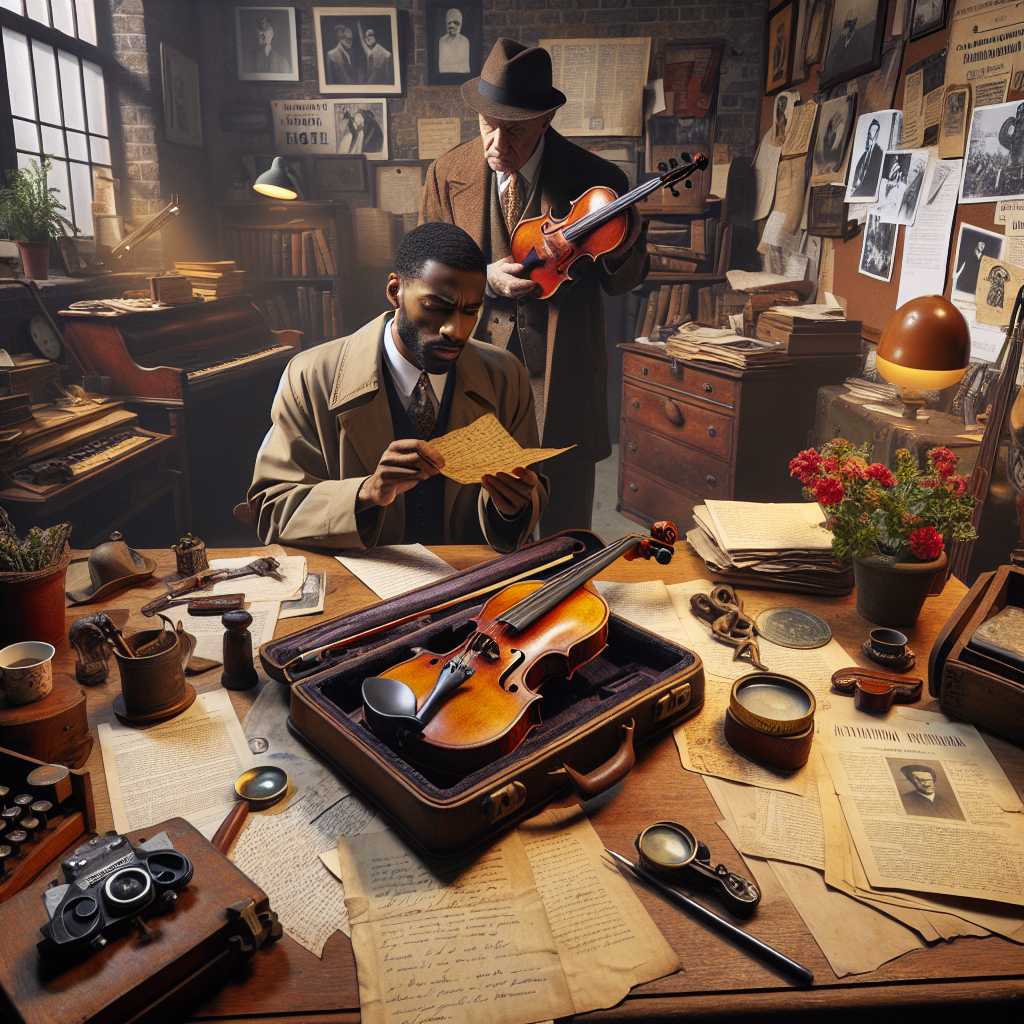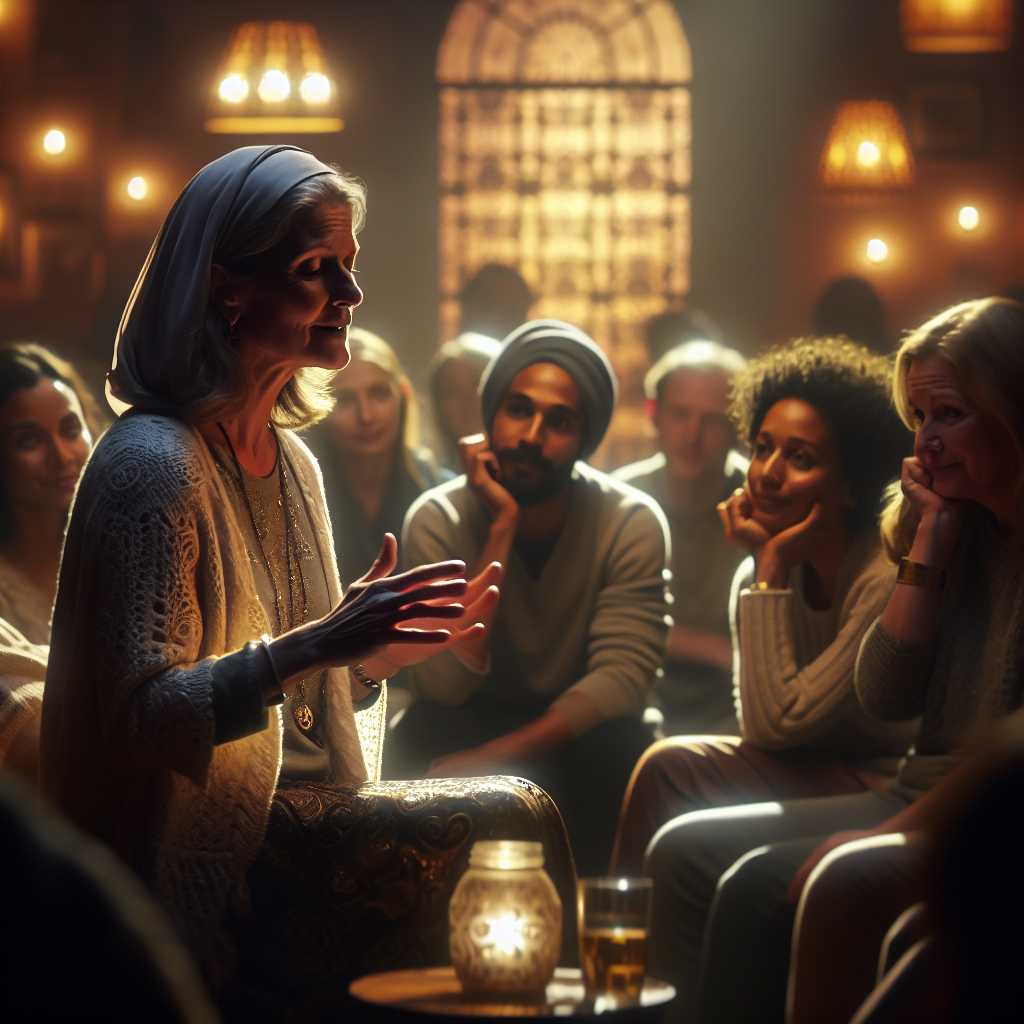
It was a foggy night in late November when Detective Samuel Givens received the call that would become one of the most intriguing cases of his career. The dimly-lit office of the Givens Detective Agency was about to see a splash of the unexpected—a trait that woven into the tapestry of his life as intricately as the great detective’s celebrated detachment from drama and turbulence.
There was a knock at the door, tentative and hurried. Samuel, a tall man with an economy of motion and a clear affability in his voice, invited the trouble inside.
"Please, come in,"
he said, gesturing toward the worn leather chairs by his desk. An elderly woman entered, clutching a brocade evening bag. Her eyes, diluted by age yet striking, told tales of a life well-lived but recently disturbed.
Mrs. Eleanor Danvers, widow and patron of the arts, sank into the chair with a sigh, the very image of distress. Her missing violin was no ordinary instrument; it was a priceless Stradivarius, handed down through generations, and tonight it had disappeared. As Samuel listened, he took in every detail with keen interest, impressed with her lucidity under the pressure of loss.
“It was stolen right under our noses, Detective,” she explained, the anxiety sharpening the normally soft tones of her voice. Mrs. Danvers had hosted an exclusive evening of chamber music at her estate. Luminaries and friends had gathered to enjoy the unmatched acoustics of the private salon, but the violin had vanished before the evening's end. A quiet chaos roiled under elegant veneer.
The next morning, Samuel took no time to prepare himself for the aura of wealth that pervaded the Danvers estate. The mansion, stately and magnificent, stood proudly beneath the reluctant sun. He began his investigation in the music room, where lush tapestries adorned the walls—telling stories of eras long bygone—and the faint scent of lilies lingered.
Indeed, the evidence of the affair lay punctuated with luxury and shadowed by its flagrant absence. It was here—a small, engraved plaque beneath an empty velvet-lined violin case—that he found his first clue. The plaque read: "To Eleanor, with all my love - Maurice."
Inside, guests were being entertained in the vast drawing-room under Mrs. Danvers’s watchful eye. Musicians wandered amidst patrons, the clinking of glasses interspersed with nervous laughter. The event had become a makeshift séance, conjuring back moments of music only a night prior.
Samuel approached a tall man standing with his back to the great marble fireplace. The man was a dilettante cellist who went by the name of Julian Hart. He had performed at the soiree and seemed perturbed by the night’s incident.
"Miss Danvers is most distressed,"
Julian said, offering a lily-laden apology. His sorrow was deeply felt yet framed by guilt, or so Samuel believed.
A shadow of suspicion fell upon the stranded artist as Samuel probed, revealing that the cellist knew of Maurice—the long-gone husband, a one-time suitor of his mother. A lover's crime, old jealousy reborn in stolen strings, Samuel mused, as he watched Julian fidget.
Continuing his investigation, Samuel explored the house to speak with Mrs. Danvers’s maid, Annette. The young woman’s dexterous nature often left her unnoticed, but Samuel found her candor refreshing. Annette’s eyes twinkled knowingly as she spoke of the salon’s sequestered corners.
"I thought I heard voices near the east end of the room after the performance," she remarked with a frustrated trace of foresight.
As night settled in, Detective Givens pieced the tale together, culminating in a revelation that was appropriately climactic. He summoned Julian, Mrs. Danvers, and Annette to the music room, the setting now staged for unveiling.
"The purloined violin is not far away and was not taken up by greed or malice," Samuel began, noting the rising curiosity. "Julian, you left the salon last among the musicians, did you not?"
Julian fumbled his reply but admitted he had. His eyes darted from Samuel to Mrs. Danvers, fixed with both accusation and hope.
"You went up to the window seat," Samuel continued, "and placed a phone call to a dear elderly woman—your mother. You admire Eleanor Danvers, but feared the growing emotions of your heart. In some weakened state of passion over the love she had shared with another, you sought solace in a hidden place."
With a gesture to Annette, Samuel had her lift the corner of a heavy curtain just below the window seat. A slender case peered through, and with it, an ebony violin bow.
"The Stradivarius will not hold our secrets,"
Samuel smiled kindly, "but Julian’s heart might."
The evening ended with a quiet understanding and reconciliation. The stolen instrument had not traveled far; it had simply been forgotten in the fever of an unshared sentiment.
Detective Samuel Givens walked into the misty night, leaving behind a better day for art and love in the world—a swirling story with a peaceful ending, etched in the history like a forgotten note played in earnest.
And so, the case of the vanished violin came to a close, its tale as intriguing as the enigmatic notes that could still be imagined in the echoes of the music room.










